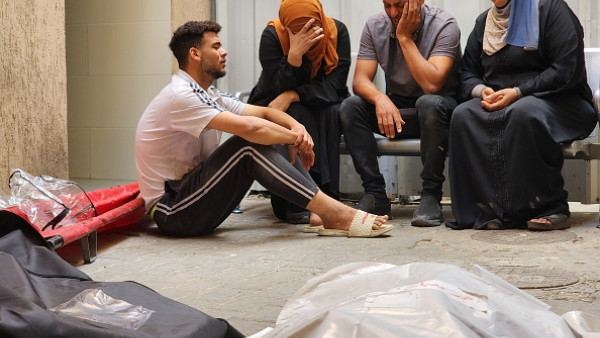Both Jenin and Hadeel are among more than 150,000 pregnant women in the besieged Gaza Strip who face terrible health conditions and immense risks. [Getty]
Pregnant women in the Gaza Strip have been facing significant challenges amid Israel’s ongoing genocidal assault on the Gaza Strip.
In separate interviews with The New Arab, several pregnant women described how they barely receive the necessary medical care after Israeli attacks have put most hospitals and clinics out of service in the besieged coastal enclave.
Many of these women spoke of how they barely get the minimum amount of food and water, in addition to personal hygiene projects, adding that many of them regularly suffer from infectious diseases and other severe illnesses.
Jenin Al-Buhaisi, a 26-year-old Palestinian woman currently six months into her pregnancy with her first child, fears for her life and the life of her child. “As soon as I wake up early in the morning, I touch her womb to feel the condition of my fetus, whether it is moving inside me or not,” she remarked to TNA. “All the time, I’m scared that I will miscarry at any moment.”
Jenin has no sustained access to clean water to bathe or help with her hygiene. She is forced to wait at least seven to ten days for the opportunity to wash after her husband can find clean water.
“We [pregnant women] are experiencing tragic conditions. There is no water, food or safety to help us survive this war (…) Unfortunately, we are afraid of death even if we are not targeted, as we may die from the lack of the nutrients we need,” Jenin said.
“Even if we survive,” she continues, “We fear that we will lose our children in our stomachs (…) Throughout the pregnancy, I did not eat any healthy food. I ate canned food that contains preservatives, and this caused me a lot of infections and severe fatigue.”
Jenin has needed to see a doctor more than once, and with great difficulty, she was able to go to one of the field clinics in her area. “There were large queues of pregnant women who have to wait for long hours, and this causes massive fatigue in addition to the possibility of infection, which will negatively impact the health of the fetus,” she noted.
“Unfortunately, danger surrounds us all without exception, and no one cares about us,” Jenin added.
Hadeel Shawa, a Palestinian woman who is nine months pregnant, shares Jenin’s experience. The 28-year-old mother of two told TNA, “I suffer from malnutrition and a lack of vitamins and iron in my body due to the lack of healthy food.”
What made the situation worse for Shawa was that she contracted bacteria in her blood system as a result of an infection she picked up from one of the public bathrooms she used.
“Since then, I have been suffering from a lack of fluids around the fetus, as well as some bleeding, which doctors have barely been able to control. I may miscarry at this very moment,” she remarked. “All the hospitals are crowded with the injured. There is blood everywhere, and the medical teams can barely deal with this large number of victims… I do not know how we will be treated as pregnant women.”
Both Jenin and Hadeel are among more than 150,000 pregnant women in the besieged Gaza Strip who face terrible health conditions and immense risks, especially with the adverse displacement movement from Rafah to the south due to Israel’s indiscriminate war on all of Gaza since 7 October, according to the United Nations Relief and Works Agency for Palestine Refugees in the Near East (UNRWA).
UNRWA warned, in a post on the X platform, that “no child in the world should suffer like this,” adding, “We need a ceasefire now.”
With the exodus of Palestinians once again from Rafah towards Khan Yunis, where there is no water or infrastructure, UNRWA denounced the deteriorating humanitarian situation, describing it as “a new level of despair, unfolding under the eyes of the world.”
Israel has been waging a war of “revenge” on the Gaza Strip since 7 October, leaving more than 34,034 dead and more than 78,000 wounded, according to official data issued by the Ministry of Health in Gaza.
For his part, the Secretary-General of the United Nations, António Guterres, said that the war in Gaza “is causing horrific human suffering,” calling on the world to press for an immediate ceasefire for humanitarian reasons.


